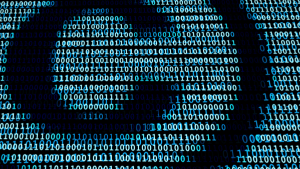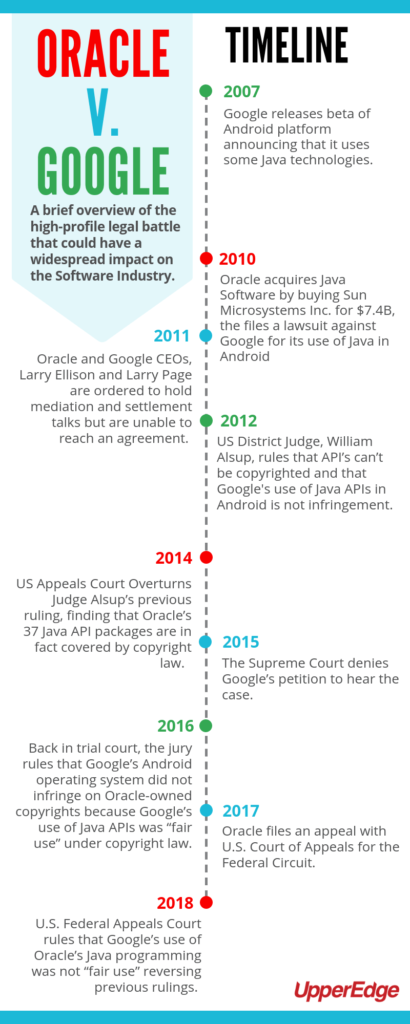- Jeff Lazarto
- Reading Time: 4 minutes

After nearly 8 years, the high-profile legal battle between Oracle and Google still has not reached a conclusion. This case has drawn a lot of attention since many Google supporters are concerned that the recent win by Oracle will significantly impact the engineering and software industries by hindering innovation and sparking many more API lawsuits of this kind. Others believe that Oracle deserves to be compensated and that not copyrighting APIs is unfair to both creators and consumers. Regardless of which tech giant you side with, the results will have an impact on how companies use and develop software.
A Bit of Background
In August of 2010, Oracle filed a lawsuit against Google for patent and copyright infringement related to Google’s unlicensed use of Java APIs as part of Android.
The latest round was won by Oracle and the case is set to go back to district court to determine the damages Google is required to pay for violating Oracle’s copyrights. There has been a lot of back and forth in this case so to help you make sense of it all, we mapped out the key highlights.
Blog continues below. [Click graphic to enlarge]
The Timeline
1995 — Sun Microsystems launches Java.
2005 — Google purchases Android Inc. and continues developing the operating system using Java.
2006 — Google rejects Sun’s offer of a 3-year Java license for $20M plus 10% of Google’s Android-related revenue, capped at $25 million.
2007 — Google releases a beta of the Android platform and announces that it would use some Java technologies.
2010 — Oracle acquires Java Software by buying the original creator, Sun Microsystems Inc. for $7.4B. Within months, Oracle files a lawsuit against Google for patent infringement with the Android operating system which was built on Java.
2011 — Oracle seeks damages of up to $6 billion. Oracle and Google CEOs, Larry Ellison and Larry Page, are ordered to hold mediation and settlement talks but are unable to reach an agreement.
2012 — A jury fails to unanimously decide whether Google’s use of the thirty-seven Java APIs as part of the Android APIs constitute fair use. Afterwards, Google demands a mistrial and Oracle motions for a judgment as a matter of law that Google’s fair use defense cannot be used in this case. US District Judge, William Alsup, denies Oracle’s motion.
Later that month, Judge Alsup ruled that APIs can’t be copyrighted and that Google’s use of Java APIs in Android is not infringement.
2012 — The district court entered final judgment in favor of Google on its claim for copyright infringement, except with respect to the rangeCheck function and the 8 decompiled security files. As to rangeCheck and the 8 decompiled security files, the court entered judgment in favor of Oracle. Oracle appeals and Google cross-appeals with respect to rangeCheck and the 8 decompiled files.
2014 — U.S. Appeals Court Overturns Judge Alsup’s previous ruling, finding that Oracle’s 37 Java API packages are in fact covered by copyright law. The court also rules in favor of Oracle with respect to the rangeCheck function and 8 decompiled security files and remands the case back to the trial court for further proceedings.
2014 — Google files a petition asking the U.S. Supreme Court to review the Federal Circuit’s decision.
2015 — The Supreme Court denies Google’s petition to hear the case.
2016 — The case goes back to the trial court and the jury now rules that Google’s Android operating system did not infringe Oracle-owned copyrights because Google’s use of Java APIs constitutes “fair use” under copyright law.
2017 — Oracle files an appeal with U.S. Court of Appeals for the Federal Circuit.
2018 — U.S. Federal Appeals Court ruled that Google’s use of Oracle’s Java programming was not “fair use” reversing previous rulings. The case is remanded back to the trial court to determine damages.
Initial Observations
This high-profile legal battle has been closely followed by many and has caused the software industry to reevaluate whether the building blocks of software programs can and should be copyrighted as well as what should be considered “fair use”. The side that has been most vocal online seems to be those in the developer and software community who believe a win for Google would be a win for the entire open source community. Though the most recent win for Oracle sounded alarm bells within the open source community, this verdict does not mean the case is over since Google can still appeal to the Supreme Court.
After its most recent win, we are wondering how Oracle will find a way to further monetize the use of Java. We have already seen Oracle ramp up audits of Java customers and make changes to the pricing structure for Java with the revamp of the commercial support program for Java SE that was announced in June of 2018.
Previously, businesses could pay for a one-time perpetual license and an annual support fee. The recent change puts Java SE on a subscription-based model that requires users to renew the subscription if they want to retain rights to any commercial software downloaded during the subscription. Depending on the outcome of the next court date, we could see Oracle implement more aggressive tactics for increasing its Java revenue stream.
The final outcome of this case will have a definitive impact on the software industry and bears watching. We will provide updates as events unfold.
Post a comment below, follow me on Twitter @jeffrey_lazarto, find my other UpperEdge blogs, and follow UpperEdge on Twitter and LinkedIn.
You may also like these other posts about lawsuits:
- Wipro Responds to National Grid’s SAP Implementation Billion Dollar Lawsuit
- Teradata Sues SAP – Implications for SAP and Its Customers
- SAP Tells Teradata to go Jump in a (Data) Lake
- Bridgestone vs. IBM: Parties Agree to Reach Agreement
- Like Taking Candy from a Baby: Sacramento Schools Claim Workday Took Advantage of Them and File Suit
Related Blogs
AWS and Google Double Down on Cloud and AI: What Enterprise Buyers Need to Know From the Vendors’ Earnings
Oracle’s AI Strategy Is Changing the Negotiation Landscape
The Top 7 Failure Modes in Oracle ERP SI Engagements
About the Author

